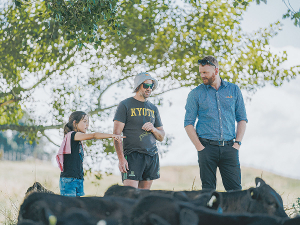Salmonellosis Surge: MPI reports rising cases in New Zealand cattle
Salmonellosis is a serious disease in cattle.
 Waikato dairy farmer Cole Townsend (middle) lifts performance of calves and cows, improving health and production.
Waikato dairy farmer Cole Townsend (middle) lifts performance of calves and cows, improving health and production.
In 2018, faced with a Salmonella outbreak among his calves and the effects of the subsequent vaccination, Waikato dairy farmer Cole Townsend turned to social media for a solution.
Witnessing his calves’ poor recovery and lack of desire to drink, he administered Probiotic Revolution’s probiotic additive Calf Xtreme. Within days, the calves recovered, surpassing his expectations in just 30 days to become the healthiest batch he had ever reared, Townsend claims.
Since then, Townsend has integrated the product into his yearly calf-rearing routine, using higher rates of milk than he had ever used.
Townsend says recognising the importance of a strong start for his calves, he administers BioRescue paste initially, followed by a gradual increase in milk on once a day feeding, to 7-8 litres by day 10.
The results have been remarkable, he says, effectively eliminating nutritional scours and helping Townsend decide he didn’t need to vaccinate the herd for Rotavirus, easily offsetting the cost of the product.
“Calf losses are negligible, heifer calves reach target weaning weights two weeks earlier and by calving they are 20-30kg heavier. There has also been a significant turnaround in fertility of first-calving heifers with empties falling to 3-4%,” he says.
Emboldened by these successes, Townsend ventured further, introducing SuperStart Lead Feed for springers in 2019 and Rumicell for milkers in January 2020. These innovations aimed at enhancing feed conversion efficiency and bolstering herd immunity yielded impressive results. Cows are presenting better at calving.
“We used to assist 10% of the herd whereas now it is only 3-4%. The quality of colostrum is better, there is a rapid increase in milk and cows are getting to peak production 10-14 days earlier,” he says.
Results with mastitis have also been impressive. Cell counts in the first season halved from 120,000 and have generally been below 80,000 ever since. There has also been noticeably less mastitis with annual cases dropping from 15% of herd numbers to 6-7%, except in wet summers.
Townsend says his experience during a drought with the herd on OAD milking provided compelling evidence that daily Rumicell feeding translates into increased milk production.
“Ceasing Rumicell supplementation led to a drop in milk production and a noticeable decline in cow temperament and manure quality. Production lifted again when it was reintroduced. I’m convinced and have been using Rumicell ever since.”
Matt Collier of Probiotic Revolution points out that in the shortterm different herds can respond differently. From a trial done at Lincoln University there was a 22% increase in acetate levels from Rumicell indicating a substantial improvement in feed conversion especially from fibers in the diet.
“We see better rumination and cud chewing because of blood sugars rising, triggering the part of the brain responsible for cud chewing.
While around 50% of herds may experience an initial production boost, factors such as stage of lactation, feed availability and body condition can influence outcomes. Sometimes extra energy is redirected to body condition or when feed is abundant more grass is left behind.
“We like to work with our farmers so that they get a highly profitable outcome.”
Townsend says his journey exemplifies the transformative power of innovative practices and probiotic solutions in dairy farming.
“From overcoming calf ailments to optimising herd health and productivity, each step reflects a commitment to excellence and a willingness to embrace new approaches for sustainable and efficient farming.
“I hope my story serves as a beacon of inspiration for dairy farmers navigating the evolving landscape of agricultural practices and technologies.”
Beef + Lamb NZ (B+LNZ) is calling for significant changes to the Government’s reforms to the Resource Management Act (RMA).
NZPork says the Government needs to strengthen its proposed planning laws to ensure New Zealand's pig farmers can continue to produce pork.
Good news for kiwifruit growers - a record crop with forecast per hectare returns at record levels for all fruit categories for the 2025-26 season.
As guests gathered on what is known as the Speaker's Lawn - a beautifully manicured patch of grass behind the main buildings of Parliament - to mingle and enjoy a lamb chop to celebrate National Lamb Day, the mood was very much upbeat.
Global dairy prices are on a roll, recording a fourth consecutive jump on the Global Dairy Trade (GDT) auction this year.
Booming primary sector exports are helping lift earnings for farm service providers.
OPINION: Staying with politics, with less than nine months to go before the general elections, there’s confusion in the Labour…
OPINION: Winston Peters' tirade against the free trade deal stitched with India may not be all political posturing by the…